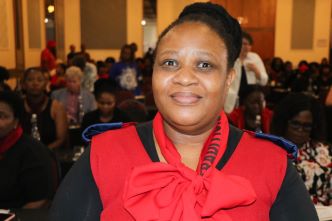Trafficking of human organs another cause for concern - 09 October 2023
Department of Social Development 2023/10/08 - 22:00

The removal of human organs and body parts is another unseen form of human trafficking that is rife across the globe and in Gauteng Province in particular., cases of child mutilation have been on the rise in the province.
Some reports have linked this brutality to some form of ritual. To tackle this issue in an effort to create awareness about this hideous crime, the Gauteng Department of Social Development together with traditional healers associations engaged on this matter shared some light during the second day-two of the Trafficking in Persons (TIP) Seminar.According to Gogo Brenda Selibi from Alexandra who is also and member of the Traditional Healers Organisation, persons who are targeted for organ removal are frequently chosen from mainly vulnerable groups (such as those who are living in extreme poverty) in order to obtain wealth and power for various social and political reasons.“Women and children who are unable to defend themselves and are more frequently targeted, attacked and killed. Many persons with albinism have been forced to leave their homes, communities, and economic activities as a result of this practice in order to protect themselves,” she said.Gogo Selibi further urged communities not to link criminal activities with traditional healing practice.“People don’t know the difference between traditional healing and witchcraft which is different. Witchcraft involves supernatural powers that are even more harmful, whereas traditional healing is all about healing and wellness. You cannot begin to talk about the wellness of a human being when you also practice witchcraft which involves killing,” said Gogo Selibi.The Gauteng Department of Social Development will continue to work with all stakeholders to fight and prevent human trafficking by building resilience in communities.Over 160 Social Workers (GBV, VEP, School Social Workers) were capacitated in the 2022/23 financial year with training to be able to identify trafficking victims, particularly among vulnerable groups such as children, individuals in commercial sex, labor exploitation and internally displaced persons
RELATED NEWS
No related news

